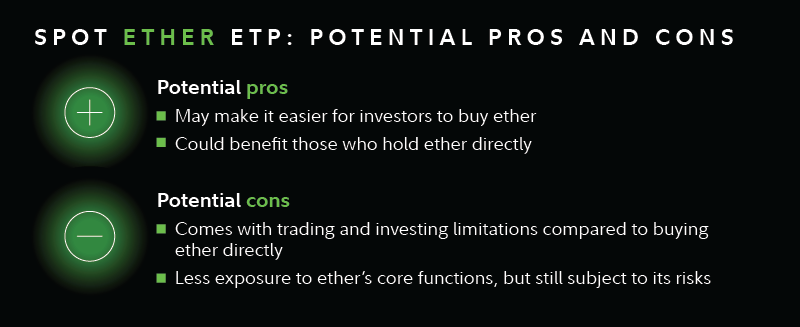On May 20, 2024, ether's price closed the day up over 19%, due in part to rumors that the US Securities and Exchange Commission (SEC) would soon announce a rule change allowing the trading of several spot ether exchange-traded products (ETPs). Days later, the SEC did indeed make the announcement, sparking a wave of optimism regarding crypto's future.
Why are crypto enthusiasts celebrating the news? And what are the potential drawbacks of crypto ETPs? Let’s take a closer look at what the spot ether ETPs are and how they work.
What are spot ether ETPs?
Spot ether ETPs aim to track the price of ether. They hold units of ether as the underlying asset, and can be bought and sold on many traditional brokerage platforms just like other investments, such as stocks.
Before we dive into the details, here’s a quick refresher on ether and the Ethereum network.
In addition to facilitating its cryptocurrency, ether, the Ethereum network also allows developers to build apps and other blockchain networks using its platform. Ether has an unlimited max supply of tokens, and due to a 2022 update called The Merge, the Ethereum network operates on a proof of stake model.

Potential pros of spot ether ETPs
May make it easier for investors to buy ether
The spot ether ETP can be a convenient option for those who aren’t familiar with the nuances of holding cryptocurrencies directly.
When buying ether directly, the investor is responsible for researching platforms, creating a crypto wallet, managing cybersecurity, calculating crypto taxes, and more. Moreover, crypto is currently less regulated compared to traditional assets.
In contrast, buying the ETP is a lot like buying stocks or index funds. Everything can be done through a traditional brokerage platform, which removes some of the responsibilities associated with buying ether directly. This may make getting exposure to ether easier for those who find the process for buying crypto directly complicated.
One thing to note is that those who buy the ETP must still trust that the ETP issuer is managing their crypto cybersecurity effectively. Because the ETP holds actual ether as its underlying asset, the issuer should be responsible for following crypto best practices.
Could help boost ether’s price
The approval of the spot bitcoin ETP in January 2024 drove a significant amount of institutional money into bitcoin. It added fuel to the fire of a recovering crypto market, helping push bitcoin’s price higher. Ether proponents hope the ether ETP will do the same for ether’s price. Of course, it is not guaranteed that the ETP will drive the price higher, and much like bitcoin, ether may continue to be subject to significant volatility.
It’s worth mentioning that ether has a few unique supply and demand characteristics when compared to bitcoin. For example, ether holders can stake their coins—an action that involves locking up their coins for a period of time in exchange for interest. Because a sizable portion of ether’s available supply is currently staked, supporters hope that the combination of (1) limited supply from staking and (2) increased demand from the ETP approval will drive prices up.
Note: Those who buy the ETP will not be able to stake their holdings. We’ll discuss why shortly.
Another potential factor to consider is ether’s burning mechanism. Because it has an unlimited supply of coins, the Ethereum network burns (i.e., deletes from existence) a number of coins every time a transaction is made. The idea is that this will help prevent inflation. If the ETP brings in a wave of new money, the increase in transactions would trigger more burning, which could in turn further decrease the circulating supply. Supporters hope this will also lead to higher prices.
Potential cons of spot ether ETPs
Comes with trading and investing limitations compared to buying ether directly
The spot ether ETP can only be traded during traditional market hours, while crypto trades 24/7. One of the risks of owning the ETP is that you miss price changes that occur on weekends. If ether makes a large move outside market hours, you won’t be able to capitalize (or cut losses) until traditional market hours resume.
Another risk to consider is that as with any ETP and its underlying assets, the spot ether ETP doesn’t track the price of ether perfectly, due to management fees, rebalancing costs and delays, and other factors. Buying the ETP allows you to get exposure to ether’s big-picture price moves, but won't always reflect them on a 1:1 basis.
Finally, only time will tell if the ether ETP achieves widespread adoption. In the event it doesn’t, your buys and sells may be less likely to be filled at your desired price. In contrast, you’re more likely to get your desired price by buying ether directly, as the crypto market is comparatively more liquid.
Less exposure to ether’s core functions, but still subject to its risks
Those who own ether can stake their coins, send them to friends and family, and use them to interact with DeFi apps, smart contracts, NFT collections, and other products and services in the Ethereum ecosystem.
In contrast, the ETP’s only function is to track ether’s price for your portfolio. While there has been speculation about the possibility of adding a staking function down the road, the current round of ETP approvals do not offer staking capabilities. This is due primarily to regulatory uncertainty around the concept of staking.
And while holders miss out on ether’s fundamental functions, they’re also still exposed to some of the cryptocurrency’s underlying risks. For example, the Ethereum network periodically upgrades its protocols. While these upgrades are intended to improve its function, there’s no guarantee they will result in positive effects on its price.
What to consider when deciding between buying ether and a spot ether ETP
Those looking for investing exposure to ether but aren’t up to date with crypto best practices may find it most convenient to buy the ETP. The process is easier than buying ether directly, and will likely be familiar if they’ve previously bought traditional assets like stocks.
Of course, also be mindful of the trade-offs, which can include imprecise price tracking relative to ether’s true price, inability to trade 24/7, and a lack of key ether functions like staking. Most importantly, adding ether to your portfolio should align with your goals, risk tolerance, liquidity needs, tax considerations, and any other factor specific to your situation.
For both options, remember that ether and other cryptocurrencies are highly volatile and may be more susceptible to market manipulation than other securities. Note that crypto holders do not benefit from the same regulatory protections applicable to registered securities, and the future regulatory environment for crypto is currently uncertain. Crypto is not insured by the Federal Deposit Insurance Corporation or the Securities Investor Protection Corporation, meaning you should only buy cryptocurrency with an amount you’re willing to lose.


